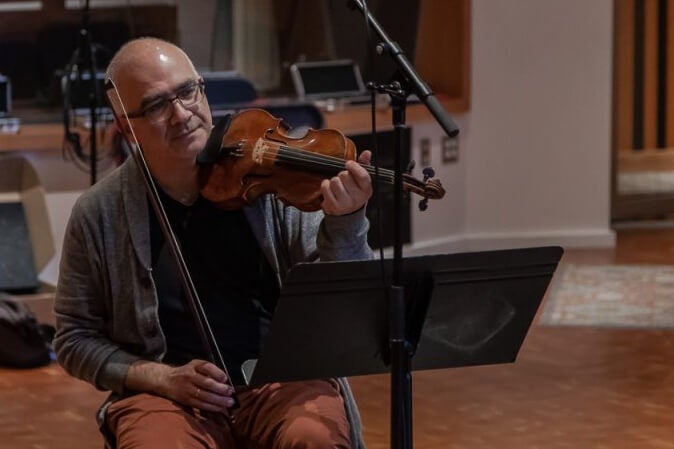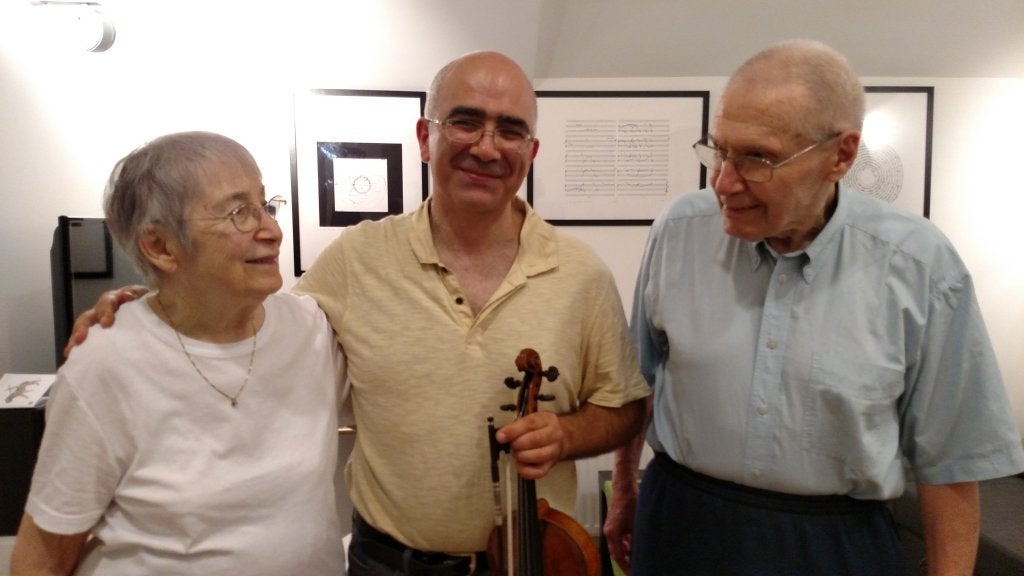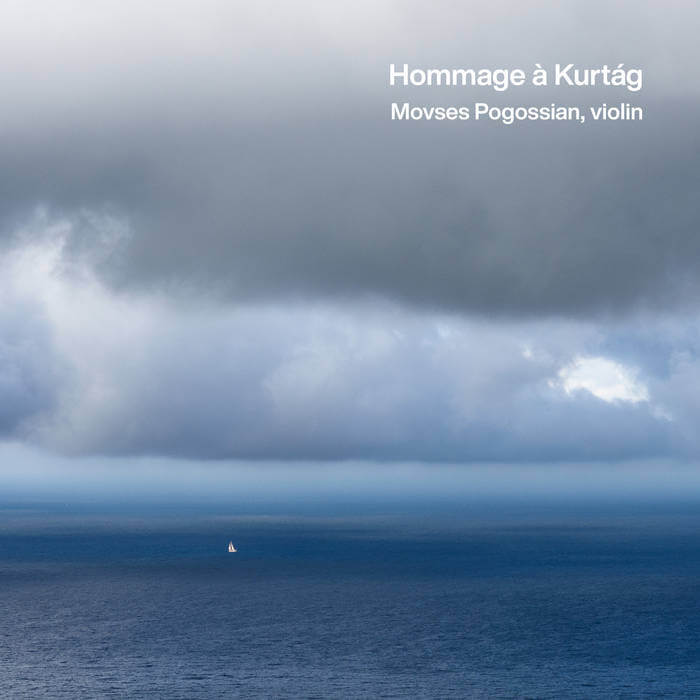It was 2004 and Movses Pogossian was preparing the legendary Hungarian composer György Kurtág’s famously intricate Kafka Fragments with soprano Tony Arnold. On a whim, they contacted the composer to see if he might consider rehearsing with them. To their surprise, Kurtág invited them to Budapest to participate in a four-day masterclass.
“We knew he had a reputation for being exacting and demanding,” said Arnold. “So we prepared ourselves to be as flexible as possible. But we were still anxious.” Kurtág lived up to his reputation, at times exasperating the two musicians and even driving one of them to tears. (More on that later.) But their time with the famous composer was rapturous.

The bond formed between the musicians and composer was lasting. Pogossian’s most recent recording, Hommage à Kurtág, will be released with New Focus Recordings on October 21, 2022. On Monday, October 24 at 7:30 p.m. in Schoenberg Hall, Pogossian will perform a recital featuring music from the new CD, including what promises to be the definitive recording of Kurtag’s Signs, Games and Messages for violin.
Kurtág is considered by many to be the world’s foremost living composer, if such a title could be claimed. His music is notoriously difficult to pin down. He writes in a short, gestural style. Whole compositions might only be a few minutes long. But brevity is no bar to complexity, and Kurtág packs more expression into fewer notes than any other working composer. New Yorker music critic Alex Ross may have put it best when he said of Kurtág’s music that it is “compressed but not dense, lyrical but not sweet, dark but not dismal, quiet but not calm.”
Kurtág’s balance of opposing forces carries special resonance for Pogossian, who remarked “there is never a sense in his music that any note could have been different.” Kurtág’s laser precision, however, is anything but chilly. “His music is deeply of the heart,” explained Pogossian. “There is real warmth in his music. He is not obscure or distant.”
Pogossian’s CD and recital include four new works for solo violin, commissioned by Pogossian as response pieces to Kurtág. The composers—Aida Shirazi, Kay Rhie, Jungyoon Wie, Gabriela Lena Frank, female composers all—discuss their pieces in the CD’s liner notes.

The recital will also include a Kodaly Duo for cello and violin, featuring celebrated Scottish cellist Niall Brown. A selection of Bela Bartók’s duos also graces the program, featuring music education violin students Kayla Phan, Yidan Sun, Yoosung Lee, Emily Taylor, Raina Markham, Kayla Lee, and alumnus Sam Lorenzini.
“Bartók, Kodaly, and Kurtág all wrote music for children, music for pedagogical purposes,” said Pogossian. “They understood that music was for everyone. They didn’t draw false distinctions between highbrow and lowbrow music, and I want to pay homage to that too. It is a real pleasure to bring our very fine music education students up on stage to perform this wonderful music.” It is also noteworthy that Pogossian will donate all proceeds from the concert and CD sales to a cause that he—and his students—work for and hold dear: Music for Food. A musician-led initiative, Music for Food has helped provide close to 2 million meals for people in America who suffer from food insecurity.
The recital’s ambitious program—new commissions, challenging solo violin work, and multiple performers—is held together conceptually by the figure of György Kurtág, who idolized Bartók and Kodaly and has inspired so many young composers and musicians.
It takes Pogossian back to that defining moment in 2004, when he and Arnold worked for four days with Kurtág on his Kafka Fragments.
“You are really like Sherlock Holmes when you begin playing his music,” Pogossian explained. “First you have to understand the notes, you have to see it with your eyes and understand it. But then you have to develop your approach. You internalize it. It becomes you, you become it. After working intensively with him and realizing how much importance he gives to a single moment of his music, it is thrilling. And exhausting.”
Certainly it was. Arnold spent one hour during that masterclass with Kurtág working on a single bar of music. After it had finally been performed to Kurtág’s satisfaction, he applauded joyfully and said “very good.”
As Kurtág turned his attention to Pogossian, Arnold settled into a chair on the stage, relieved for the break. Within a few seconds, the relief turned into a flood of emotion and tears. Marta Kurtág, György’s wife, spotted it from the audience and alerted her husband. He sprang into action. Still agile at 78, he leapt onto the stage, took Arnold by the shoulders, and kissed each of her cheeks twice.
“You must know,” Kurtág told the musicians, “you are like my larger family.” Then he struggled for words, English being one of a half dozen languages that he speaks. “It is… it is for better, it is good.”
“Kurtág is not just a great composer, he is a great human being,” said Pogossian, recalling the event. “His humanity inflects his music. It was humbling to embark on this recording, and to be able to plan this recital with my students, especially since the concert will benefit another cause I am passionate about, Music for Food.”

